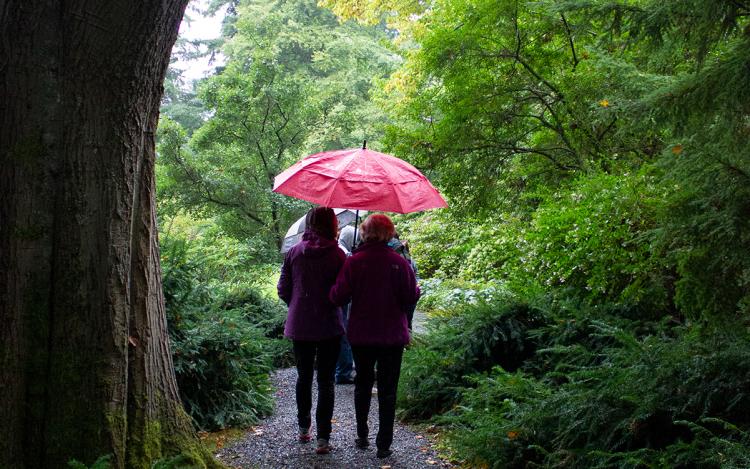As published in Dimensions Magazine - Fall 2018
Eyeing the day that a high-speed bullet train connects Seattle to Vancouver, a group of researchers are seizing the opportunity to foster more collaboration in the Cascadia region. Citizens Across Borders, a newly launched partnership between the University of British Columbia, Vancouver (UBC) and the UW Memory and Brain Wellness Center, aims to support the social citizenship of people living with memory loss and dementia.
Social citizenship, a concept defined by researchers in the UBC Centre for Research on Personhood in Dementia, means a relationship, practice, or status in which the person with dementia is entitled to experience freedom from discrimination, and to have opportunities to grow and participate in life to the fullest extent possible, with a sense of purpose and belonging.
The UW-UBC collaboration will bring people together to learn about creating sustainable dementia-friendly communities, which are perhaps the fullest expression of social citizenship. A major goal is for the Vancouver team to learn more about Momentia, a local grassroots movement spreading from Seattle across Washington State to foster dementia-friendly communities and opportunities, such as walking groups, Alzheimer’s cafes, drum circles, painting classes, improv theatre, and nature engagement programs, made possible by a coalition of community partners and residents. (momentiaseattle.org)
“The team at the Memory and Brain Wellness Center is excited to dive into this work with our new partners in Vancouver to bring a wider vision of social citizenship for people living with dementia to the Cascadia region,” says Lee Burnside, MD, clinician and palliative care expert at the MBWC.
The first seeds of this collaboration were planted at the 2017 International Research Conference on Arts and Dementia in London, when Dr. Burnside met UBC researchers Alison Phinney and Gloria Puurveen. They all had deep research interests in arts-based methods to improve quality of experience for people living with dementia. “I remember us laughing about how you have to go halfway around the world to meet your neighbor who is working on the same thing!” says Alison Phinney, PhD, RN, Professor in the UBC School of Nursing.
Now funded by grants from the UBC and Canadian Institutes of Health Research, the team is currently traveling between cities to hold meetings and presentations. The topics include innovations that will enhance social citizenship, such as the engagement of people with dementia in planning community initiatives; and the use of art as a way for someone to express their desires and leave a legacy at the end of life. Drs. Phinney, Puurveen, and Burnside bring insights gained from their research focused in these spaces. They will guide the kinds of questions asked, for example, on how best to learn from people with memory loss about what ‘dementia-friendly’ means to them.
“We will leverage off of each other in understanding what works and what doesn’t in the context of community-based programs and experiences for people living with dementia and their care partners,” says Gloria Puurveen, PhD, post-doctoral research and teaching fellow at the UBC School of Nursing and School of Social Work. “We are working on the ground level, trying to understand, in the context of this proliferation of dementia-friendly communities, what do those look like? How are they realized and lived?”
The researchers have heard from several community groups in Canada who are keen on hearing from different communities about how they can keep these kinds of memory loss programs afloat and create more.
“The power of grassroots initiatives looks different in the U.S. than in Canada,” says Dr. Phinney. “There are pockets dementia-friendly initiatives here in Canada, but it’s not as developed as what’s happening in Seattle. I think we can learn about how American communities organize themselves to get these things going, especially in a sustainable way.”
Citizens Across Borders will compare the cities of Seattle and Vancouver, especially in terms of the governmental and non-governmental resources and support for dementia and community projects, to better inform future work.
In a separate project, Carolyn Parsey, PhD, UW MBWC neuropsychologist is also working with the UBC researchers to explore the use of virtual reality technology to aid people living with dementia. Anecdotal evidence suggests the potential of virtual reality for reducing depression and anxiety and increasing in social interaction and a sense of control in their environment. They will first conduct focus groups of people in the community and care homes to understand the feelings and interest around this technology.
This team many not be totally sure of where their paths will lead, but they certainly aren’t waiting for the train to get started! —Genevieve Wanucha





